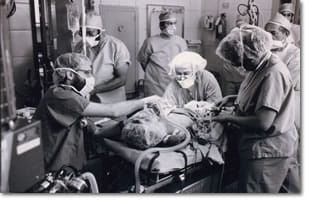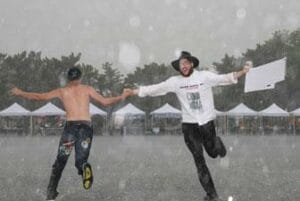by Doughlas Martin
Local anesthesia, a bit of courage and an ancient covenant fulfilled. Boris Yakobson was born during the siege of Leningrad, suffered persecution in the Soviet Union for being a Jew and immigrated to New Fork City a year ago. He has a job as a porter in a Russian nightclub in Brighton Beach.
On Wednesday, he sat in a blue hospital gown waiting for something he has long wanted. At 47 years of age, he was going to be circumcised.
God told Abraham that “every male among you should be circumcised,” but this sacred covenant wasn’t easily followed in the atheistic Soviet Union. Indeed, Mr. Yakobson’s own family tried to protect him from dangers inherent in a Jewish identity: His grandmother and mother refused to teach him the Yiddish they spoke to one another.
So on the sunny morning of the seventh day of the month of Tammuz in the year 5751 of the Jewish calendar, a miracle was about to occur in the day surgery unit of the Interfaith Medical Center in the Crown Heights section of Brooklyn. A soul was taking flight.
“I want to feel myself a real Jew,” Mr. Yakobdon said in halting English, “I am very happy I have the opportunity to be within my people.”
Then came the short walk to the operating room where the bris would be done with local anesthesia. Mr. Yakobson raised his thumb and smiled, but there seemed to be a glint of nervousness in his eyes.
* * *
The operation went quickly and smoothly. As he sipped champagne and nibbled cheesecake afterward, Mr. Yakobson took glory in his new name, Boruch, Meaning “blessed” in Hebrew. “It is a wonderful day for me,” he said. “Memory day.”
What was happening here represented a step toward identity, part and parcel of the process that all the immigrants swarming to New York City face. For Russian Jews, the process is complicated. Though eager for a chunk of the American dream, they aren’t simply hoping to be Americanized. They seek a part of themselves they have never been allowed to truly know.
Hence, the organization Friends of Refugees of Eastern Europe, or FREE. It was started by two Russian brothers, Meir and Hershel Okunov, rabbis in the Lubavitcher Hasidic movement who immigrated to this country in 1967 and started the organization two years later. Mr. Yakobson’s was FREE’s 9,348th bris.
“We’re living in a cold world,” Meir Okunov said. “The Torah tells us the think of another Jew as one’s self.”
The group’s efforts — which also include helping Jews learn to keep kosher kitchens, running a Russian-speaking synagogue and schools and offering social & humanitarian services — find parallels in the work of many New York Jewish organizations. Though most of the Jews leaving Russia now stream to Israel, this year almost 40,000 are still expected to come to the United States. Of these, more than half may come to this area. People are scrambling to help.
This influx has led to a war for immigrants’ souls. Christian missionary efforts, often conducted by Russian-Americans of Jewish backgrounds who offer such inducements as free summer camps, are viewed as a threat by many Jews.
* * *

So the Lubavitchers have struck back with free camps of their own. And one thing they can offer that the Christians certainly can’t is free circumcisions performed by a trained mohel.
Why anyone past the age of eight days, the standard time for a bris, would want one is another matter. “There are just so many chances of problems developing,” said Dr, Errol Mallett, the Interfaith chief of urology.
But he is quick to say that there have been only the slightest complications in thousands of operations at Interfaith, many of which he has overseen. “He can do as a good a circumcision as most urologists in the country,” Dr, Mallett said of Rabbi A. Rome Cohn, FREE’s mohel.
Reasons for seeking brises vary. Some Jews here on tourist visas seeking political asylum believe it will strengthen their cases if they get circumcisions they were denied back home. Others see advantages in being part of the Jewish community. But most who have undergone the operation cite loftier aspirations.
Said Igor Goldberg, 32: “It’s a sign of union between you and God. That’s all, nothing more.”
Sergei Zakuta, 32: “Its soul level. A very deep thing.”
Peter Asnes, 35: “Even if it were much more painful, I would have done it.”
Rabbi Cohn said he can see wonderful transformations, even on the operating table. “It’s impossible to describe the joy in their expressions,” he said.
Might greater freedom of religion in the Soviet Union today mean the end of the Brooklyn brises? eventually, probably yes. A team of mohels has already been dispatched to Russia.




